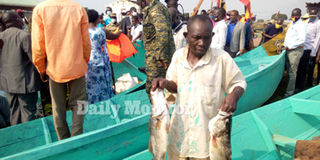What next as thousands of fishermen get vetted out?

A man carries fish on the shores of Lake Kyoga. The lake has been reopened for fishing activities after government completed the registration of fishermen. PHOTO | SIMON PETER EMWAMU
What you need to know:
- In Serere District, more than 10 landing sites have been having over 1,000 boats. In the new measures and guidelines, about 450 boats and fishermen will return to the lake, leaving close to 600 in search jobless.
While registered fishermen jubilated on Monday as the State Minister for Fisheries, Ms Helen Adoa, flagged off the reopening of Lake Kyoga, thousands more faced an uncertain future.
All fishermen operating on the lake had been asked to register but only a few were successfully vetted and approved. Those who were left out are now pondering the next move and what life will be like outside the fishing occupation.
Restrictions imposed on fishing activities as the government announced the reopening plans of Lake Kyoga have left more than 12,000 fishermen without business.
According to ministry of Agriculture, Fisheries and Animal Husbandry, of the 23,000 fishing boats positioned on Lake Kyoga before the ban was imposed in 2017 and 2019, only 11,000 registered boats and fishermen will operate on the lake.
Ms Rogers Musazi, the chairperson of Ninga Village, Nakasongola District, says Nakasongola had been allocated 1,112 boats but the number was reduced to 700. He says hundreds of fishermen, who have been earning a living for decades through fishing, were vetted out during the registration exercise.
Mr Charles Bizo, one of the fishermen who missed out among those registered in Rwapanga Landing Site in Nakasongola, says he will venture into watermelon farming.
“Let those who have been taken go for fishing, the Lord will provide other alternatives,” the fisherman said, adding that the price of Shs1.7m per boat is high for even the registered fishermen.
In Serere District, more than 10 landing sites have been having over 1,000 boats. In the new measures and guidelines, about 450 boats and fishermen will return to the lake, leaving close to 600 in search jobless.
Ms Adoa says all the developments being done on the lake will benefit both the fishermen, government and also preserve the lake for posterity purposes.
“The stakeholders implementing this mean no harm to the people. These guidelines are for our benefit,” she says.
BACKGROUND
Fishing ban. The government slapped a ban on fishing activities on Lake Kyoga because of unregulated fishing. The ban came into force in Nakasongola in 2017. Later, it was spread to Amolatar in 2018 before other districts were brought on board in the subsequent year of 2019, and 2020 respectively, bringing the entire fishing industry to a halt.
Compiled by Simon Peter Emwamu, Bill Oketech, & Patrick Ebong



